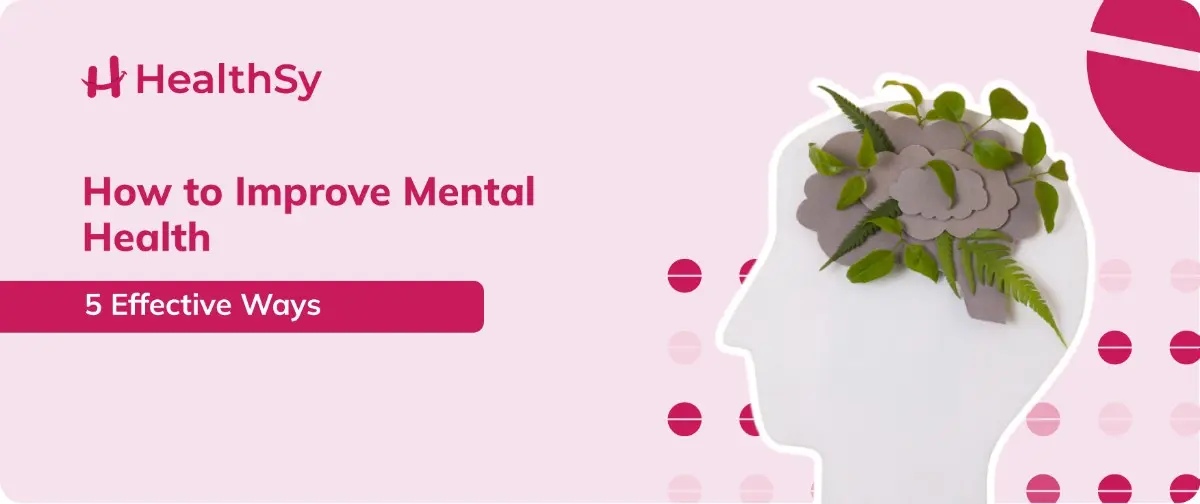How to Improve Mental Health: 5 Effective Ways

In today's fast-paced world, navigating the challenges of work, relationships, and daily responsibilities can leave us feeling overwhelmed and stressed. However, taking proactive steps to nurture your mental well-being can make a significant difference in your overall quality of life. In this blog, we'll explore five effective ways to improve your mental health, providing you with practical tips and insights to help you lead a happier, healthier life. Whether you're dealing with chronic stress, anxiety, or just looking to boost your mood, these five simple yet powerful ways can help with your journey to better mental health.
1. Prioritize Quality Sleep
Sleep is the unsung hero of mental health, and during those precious hours of sleep, our brain absorbs emotions, consolidates memories, and replenishes for the coming day. To maximize the benefits of sleep, maintain a consistent sleep schedule, including weekends. Create a peaceful evening ritual that includes a warm bath, light reading, and gentle stretches. Keep the bedroom cool, dark, and quiet. Avoid screens for at least an hour before bedtime, and minimize caffeine and alcohol consumption, particularly in the evening. Aim for 7-9 hours of good sleep per night. If you are constantly unable to sleep, consult a healthcare professional to rule out underlying disorders such as sleep apnea and insomnia.
2. Move your Body Regularly
Exercise isn't just for physical fitness; it is also a powerful mood booster and stress reliever. Regular physical activity can help reduce anxiety and depression symptoms, improve cognitive function, enhance sleep quality, and boost energy levels. And the good news is that you do not have to become a fitness freak to gain these benefits. Begin with activities you enjoy, like
- Walk for 30 minutes daily
- Dance to your favorite playlist
- Try yoga
- Go swimming or biking.
Aim to complete at least 150 minutes of moderate-intensity exercise per week. Remember that consistency trumps intensity when it comes to mental health benefits.
3. Foster Social Connections
Having meaningful interactions is essential for maintaining mental wellness. To develop your social relationships, connect with friends and family on a regular basis, even if it is just a quick text or phone call. Join clubs or groups that interest you, volunteer in your community, or try therapy or support groups if you're having trouble connecting. Remember, quality is more important than quantity. So, concentrate on making a few deep, meaningful connections rather than maintaining a large social network.
4. Practice Gratitude
Gratitude is more than just a buzzword; it is an effective technique for shifting the way you feel. Regular gratitude practice can lead to increased happiness, reduced symptoms of depression, improved sleep quality, and increased resilience to stress.
Make gratitude a daily habit:
- Keep a gratitude journal, noting three things to be grateful for each day.
- Express gratitude to others through thank-you notes or verbal expressions.
- Practice gratitude meditation, focusing on things to be grateful for.
Gratitude is not about disregarding life's difficulties; it is about finding balance and perspective in both the good and the bad.
5. Acquire New Skills
Research shows that learning new skills can help your psychological well-being by boosting self-confidence and self-esteem, developing a feeling of purpose, and helping to connect with others.
Even if you think you don't have enough time or don't need to learn new things, there are numerous ways to incorporate learning into your life. You could try some of the following like:
- Try cooking something new. Start eating a healthy, balanced diet.
- Consider taking on a new duty at work, such as developing your present abilities.
- Work on a DIY project, such as repairing a broken bike, garden fence, etc...
- Consider studying a new language or a new practical skill.
- Try new interests that challenge you, such as writing a blog, joining a new activity, or learning to paint.
When Should You Seek Professional Help for Your Mental Health?
Here are some signs that might indicate it is time to consider therapy:
- Persistent anxiety that interferes with your normal activities or relationships.
- Noticeable changes in your sleep patterns, whether it is difficulty falling asleep, staying asleep, or sleeping excessively.
- Struggling to focus or concentrate on tasks that were once manageable
- Significant shifts in your appetite or eating habits.
- Finding it challenging to complete everyday tasks or engage in activities you usually enjoy.
- Experiencing notable changes in your sleep or eating patterns, whether it is too much or too little.
Remember, seeking help is a sign of strength, not weakness. If you are experiencing one or more of these symptoms consistently, it might be beneficial to consult a mental wellness therapist. They can provide specialized support tailored to your unique needs, helping you navigate challenges and work towards improved mental well-being.
Take the First Step Towards Better Mental Health with HealthSy
Seeking professional help has never been more convenient. At HealthSy, we have simplified the process of connecting with mental health experts. Our platform allows you to browse and select a mental wellness therapist that best suits your needs and preferences. The best part? You can access high-quality mental health support without leaving your home.
Whether you are dealing with stress, anxiety, or just need someone to talk to, HealthSy makes it easy to get the support you deserve. Take control of your mental well-being today – book a session with a qualified mental wellness therapist and start your journey towards a healthier mind, all from the comfort and privacy of your own space.

Does everything feel like something in the past still plays a loop in your mind, stealing your peace of mind and causing fear? Then don't worry, you are not alone! Be it any traumatic experience, such as a natural disaster, serious accident, or personal assault, it will no doubt leave a long-lasting mark on your life. For some, a few unexpected circumstances will create serious mental health issues known as post-traumatic stress disorder (PTSD).
So, what do you mean by PTSD in real terms? PTSD, also known as Post Traumatic Stress Disorder, is something vast and has so many things that you should know. Now, in this blog, let us get to know the PTSD meaning, signs, treatment, symptoms, and causes of PTSD.
Knowing leads to healing.
PTSD Meaning
The PTSD meaning goes beyond just feeling sad or anxious after a bad event. It refers to a mental health condition triggered by experiencing or witnessing trauma. People with post-traumatic stress disorder may feel trapped in their past, haunted by memories, flashbacks, or nightmares.
PTSD meaning also includes a broad spectrum of emotional and physical symptoms that affect daily life. While it's common to experience stress after trauma, post-traumatic stress disorder occurs when that stress doesn't fade with time and instead intensifies.
PTSD Causes
There are various causes for PTSD, and a few are below:
- Sexual Assault
- Severe Accidents
- Natural Disasters
- Emotional Abuse
- Loss of loved ones
Everyone has their own reason to have PTSD, so it varies accordingly.
PTSD Symptoms
One of the most critical aspects that must be noticed about PTSD is the way it occurs or reflects in everyone. The symptoms vary drastically. The following are a few prevalent ones to know:
- Nightmares
- Intrusive thoughts
- Feeling numb
- Hypervigilance
- Avoiding people and surroundings
- Getting easily startled
PTSD Diagnosis
A clinical psychologist or psychiatrist will usually diagnose the symptoms and the root cause of the PTSD. They use specific criteria based on PTSD, meaning as outlined in diagnostic manuals like the DSM-5.
It's important not to self-diagnose. What you think is anxiety or stress might be post-traumatic stress disorder, and getting the right help starts with understanding the real PTSD meaning.
PTSD Treatment Options
There are a few best treatments that are available to treat PTSD. A few include:
- Cognitive Behavioural Therapy (CBT) helps patients reshape negative thoughts.
- Exposure Therapy – slowly reduces fear by confronting traumatic memories in a safe setting.
- Medication – antidepressants and anti-anxiety drugs may help manage symptoms.
- Group therapy – sharing experiences helps normalize the struggle.
Each method aims to ease the burden of post-traumatic stress disorder and help individuals reconnect with life.
Conclusion
Post-traumatic disorder is not something that defines who you are. It is simply a part of life's journey. Knowing the actual PTSD meaning and various other information about it would be of great help to lead a happy and healthy life. If you don't feel like things are going well, immediately seek help or visit a healthcare provider.

Mood swings are natural and are often misunderstood as a part of human emotional health. Almost every individual would experience mood swings, but their frequency, causes, and intensity vary based on the person. In both women and men, these mood swings can happen due to the complex interplay of psychological, biological, and environmental factors. So, do these mood swings happen, and how do they differ in men and women?
Let’s get to know more!
What are Mood Swings?
Mood swings refer to sudden and often extreme changes in an individual’s emotional state. Everybody experiences them globally. One might feel happy one minute and sad the next. These emotional shifts can be mild and severe and may happen occasionally or often, depending on the root cause. They can efficiently affect your routine lives regardless of their frequency and severity.
The Science Behind Mood Swings
To understand mood swings, you must know more about the brain and the neurotransmitters such as serotonin, dopamine, and norepinephrine. These chemicals significantly influence how we feel, think, or do about anything in life. The imbalance in any of these chemicals will cause you mood swings. Hormonal changes, particularly in estrogen as well as testosterone, will immediately cause mood swings.
Mood Swings in Women
Mood swings in women are more based on hormonal changes. The following are a few common causes:
- Pregnancy: Hormonal surges happen during pregnancy and will drive unpredictable mood swings
- Menopause: The transition into menopause will cause significant mood swings due to hormonal issues, anxiety, and irritability.
- Menstrual Cycle: Most women face mood swings before and after their periods due to fluctuations in estrogen and progesterone levels.
- Postpartum: After childbirth, many women experience mood swings due to drops in hormones, lifestyle changes, lack of sleep, and so on.
As mood swings in women are mostly linked to psychological and biological causes, various other factors like lack of sleep, lifestyle changes, and surroundings will also play a significant role.
Mood Swings in Men
Although often overlooked, men also experience mood swings—though the triggers might differ.
- Low Testosterone: Testosterone affects mood, energy, and mental clarity. Low levels can lead to irritability, depression, and mood swings.
- Midlife Crisis: Emotional turbulence during middle age can manifest as mood swings, especially when tied to personal or professional dissatisfaction.
- Chronic Stress: Workplace stress, financial pressure, or relationship issues can cause frequent mood swings in men.
- Mental Health Disorders: Conditions like bipolar disorder, depression, or anxiety often include mood swings as a symptom.
Men might not always express their mood swings openly, making them harder to identify and address.
Tips to Manage Mood Swings
- Exercise regularly
- Have a balanced diet
- Get good sleep
- Meditation and mindfulness
- Seek support
Final Takeaway
Mood swings are part of being human. Whether triggered by hormones, life events, or mental health conditions, they’re something everyone deals with. The good news is that mood swings can be managed effectively with greater awareness and proactive self-care.
So, the next time you or someone you love experiences mood swings, remember—it’s not about avoiding them entirely but about learning how to ride the emotional waves with balance, compassion, and resilience.

Do you feel often overwhelmed because some people seem to complete tasks more easily than you, even you put all your energy to complete the task resulting in unfinished work? This may be linked to ADHD.
Attention deficit hyperactivity disorder (ADHD) is one of the most common mental health conditions, affecting approximately 5.48 to 25.7% of general and specific adult populations of India. People with ADHD often struggle with maintaining focus, staying organized, managing their time effectively, and controlling impulsive behaviours. Addressing these symptoms with a healthcare provider is essential to improving the quality of life. This blog will let us understand ADHD and its symptoms in detail so that we can make informed decisions.
What is ADHD in Adults?
Attention deficit hyperactivity disorder (ADHD) is a condition where a person experiences a persistent pattern of inattentiveness and impulsivity, which makes it difficult for an individual to concentrate on their daily routine.
ADHD generally starts in childhood and continues after becoming an adult.
Types of ADHD in Adult
ADHD differs for each person based on their individual experiences.
- Inattention: Struggle to focus, keep pending on tasks, or being organized
- Hyperactivity: Excessive activity at all times and difficulty engaging in quiet activities
- Impulsivity: Taking decisions quickly without thinking or having trouble with self-control
ADHD Symptoms
ADHD symptoms are difficult to identify in adults. However, common signs include:
- Disorganization: People with ADHD often struggle to keep their belongings in an unorganized manner. Disorganization: People with ADHD often struggle with disorganization. For example, they may frequently lose important items, have messy workspaces
- Relationship Concerns: Consistently having relationship issues with friends, colleagues, family, or partners. This can be due to difficulties with communication, impulsivity, and emotional regulation that are common in individuals with ADHD.
- Lack of Focus: One of the key symptoms of ADHD is difficulty concentrating, as individuals frequently find themselves lost in their own thoughts.
- Difficult to Relax: It can be really tough for those with ADHD during resting hours. The feeling of restlessness can be overwhelming, leading to fidgeting and the urge to get up and walk around.
- Lack of Self-Control: Individuals with ADHD often struggle with impulsivity and difficulty controlling their actions. This can lead to impulsive decision-making and behaviours that may negatively impact relationships and daily activities.
What Triggers ADHD in Adults?
- Stress
- Lack of sleep
- Poor diet
- Overstimulation
- Lack of genuine interest
ADHD Diagnosis
ADHD can be difficult to identify in adults. However, the more you understand its signs and symptoms, the better you can recognize them early.
Consulting a doctor for a better understanding of ADHD is essential for effective treatment.
ADHD Treatment
There is no proper cure for ADHD. However, it can still be treated with a combination of medication, therapy, and lifestyle changes to manage symptoms and improve overall quality of life.
Conclusion
ADHD in adults is quite common, with experts estimating that it affects between 2.5% and 6.76% of adults worldwide. With the right support and resources, individuals with ADHD can develop effective strategies to manage challenges and cultivate their strengths, enabling them to thrive academically, socially, and professionally. If you think you have ADHD, consult a doctor for help.

Intellectual disability (ID) is a neurodevelopmental condition that affects approximately 1-3% of the global population. It impacts both cognitive functioning and adaptive behaviour, beginning before age 18. Let's explore this condition in depth to better understand its nature, causes, symptoms, and available treatments.
Understanding
Intellectual Disability
Intellectual disability manifests as significant limitations in both intellectual functioning and adaptive behaviour. This means affected individuals may have difficulties with reasoning, learning, problem-solving, and everyday social and practical skills. Unlike some other cognitive conditions, ID is not a mental illness but a developmental condition that affects how quickly and effectively someone learns and adapts.
Causes of Intellectual Disability
Intellectual disability can arise from various factors that occur before birth, during birth, or in early childhood. Understanding these causes is crucial for prevention, early intervention, and appropriate medical care. Many cases involve multiple contributing factors rather than a single cause.
Pre-Birth Causes
Genetic and Inherited Conditions Many intellectual disabilities stem from genetic mutations, which can be inherited or occur spontaneously. Common genetic conditions include Down syndrome, Fragile X syndrome, and Prader-Willi syndrome. These chromosomal abnormalities can significantly impact cognitive development.
Infections During Pregnancy: Certain infections can severely disrupt fetal development. Conditions like toxoplasmosis, rubella, and other maternal infections can lead to developmental issues, potentially resulting in conditions like cerebral palsy that may cause intellectual disability.
Exposure to Harmful Substances: Teratogens, substances that can harm fetal development, play a significant role. These include alcohol consumption during pregnancy, tobacco use, certain medications, radiation exposure, and environmental toxins. Their presence during critical developmental periods can severely impact cognitive development.
Medical Conditions During Pregnancy: Maternal health conditions can impact fetal development. For instance, hormonal disorders like hypothyroidism or poor nutrition during pregnancy can affect cognitive development and lead to intellectual disability.
Birth-Related Causes
Complications during the birthing process can lead to intellectual disability. These include hypoxia (lack of oxygen to the brain), premature birth and associated complications, traumatic brain injury during delivery, and other birth complications affecting brain development.
Early Childhood Causes
Physical Trauma Severe head injuries from accidents and brain trauma from various causes during early childhood can result in intellectual disability. The severity of the disability often correlates with the extent of brain damage.
Infections and Diseases: Serious infections like meningitis and measles, especially when they spread to the nervous system, can cause significant brain damage leading to intellectual disability. The timing and severity of these infections play crucial roles in determining their impact.
Environmental Factors: Environmental causes include exposure to toxic substances like lead or mercury, severe malnutrition during critical developmental periods, and environmental deprivation. These factors can significantly impact brain development and cognitive function.
Medical Conditions: Various medical conditions can cause intellectual disability, including brain tumors (both cancerous and benign), severe seizure disorders, and certain types of epilepsy, such as Lennox-Gastaut syndrome. These conditions can affect brain development and function in varying degrees.
Despite advanced medical knowledge, there are still cases where the exact cause remains unknown, highlighting the complex nature of this condition. Understanding these various causes helps in developing prevention strategies, early intervention programs, and appropriate support systems for affected individuals and their families.
Recognizing the Symptoms
Symptoms of intellectual disability typically appear during childhood and vary in severity. Key indicators include:
Cognitive Signs:
- Delayed milestone achievement compared to peers
- Difficulty understanding complex instructions
- Problems with memory and learning new skills
- Limited problem-solving abilities
- Challenges with abstract thinking
Adaptive Behavior Issues:
- Delayed language development
- Difficulty with self-care tasks
- Problems with social skills and interpersonal relationships
- Challenges with money management and time concepts
- Limited ability to understand and follow social rules
Treatment and Support Approaches
While intellectual disability cannot be cured, various interventions can help individuals reach their full potential:
Early Intervention Programs: Early identification and intervention are crucial. These programs provide specialized support during critical developmental periods, helping children develop essential skills and abilities.
Educational Support: Special education services, individualized education plans (IEPs), and adaptive learning techniques can help children with ID learn effectively at their own pace.
Therapeutic Interventions:
- Speech therapy to improve communication skills
- Occupational therapy for daily living skills
- Physical therapy when needed
- Behavioural therapy to address specific challenges
Family
Support and Training: Parents and caregivers receive training and support to
better understand and assist their loved ones with ID. This includes strategies
for skill development and behaviour management.
Social Integration Programs: Community-based programs that promote social interaction and inclusion help individuals with ID develop social skills and build meaningful relationships.
Living with Intellectual Disability
With proper support and understanding, many individuals with intellectual disability can lead fulfilling lives:
Independence: Depending on the severity of their condition, many people with ID can achieve various levels of independence in adult life, including living semi-independently and holding jobs.
Quality of Life: Access to appropriate support services, educational opportunities, and social inclusion significantly improves quality of life for individuals with ID.
Community Integration: Many communities now offer inclusive programs and activities that allow individuals with ID to participate meaningfully in society.
Looking
Ahead
Research continues to advance our understanding of intellectual disability, leading to improved interventions and support strategies. The focus has shifted from merely managing symptoms to promoting independence, dignity, and full participation in society.
A key development is the growing recognition that individuals with intellectual disability have unique strengths and abilities. Modern treatment approaches emphasize building upon these strengths while providing support for areas of challenge.
Conclusion
Intellectual disability presents unique challenges, but with appropriate support and intervention, affected individuals can develop their abilities and lead meaningful lives. Understanding, acceptance, and access to proper resources are crucial elements in helping people with ID reach their full potential. As our society becomes more inclusive and supportive, opportunities for individuals with intellectual disability continue to expand, with speech therapists available for home healthcare services or psychologists for consultations.

Bipolar disorder is a complex mental health condition that affects millions of people worldwide. It is characterized by extreme mood swings, ranging from manic highs to depressive lows. Understanding the symptoms, causes, and available treatments is crucial for those affected by this condition.
Bipolar Disorder Symptoms
The symptoms of bipolar disorder are the dramatic shifts in mood and energy levels. During manic episodes, individuals may experience:
- Elevated mood and euphoria
- Increased energy and activity levels
- Reduced need for sleep
- Rapid speech and racing thoughts
- Impulsive or risky behaviour
On the other hand, depressive episodes are marked by:
- Persistent feelings of sadness, hopelessness, or emptiness
- Lack of energy and motivation
- Difficulty concentrating or making decisions
- Changes in appetite and sleep patterns
- Suicidal thoughts or attempts
The severity and duration of these mood episodes can vary greatly from person to person, and the patterns can be unpredictable.
Bipolar Disorder Causes
The exact causes of bipolar disorder are not fully understood, but research suggests that it is a combination of genetic, neurological, and environmental factors. Some of the potential factors that may contribute to the development of bipolar disorder include:
- Genetic predisposition: Individuals with a close family member with bipolar disorder have a higher risk of developing the condition.
- Brain chemistry imbalances: Disruptions in the levels of certain neurotransmitters, such as serotonin, dopamine, and norepinephrine, may play a role in bipolar disorder.
- Stressful life events: Significant life changes, trauma, or stress can trigger the onset or exacerbate the symptoms of bipolar disorder.
It is important to note that bipolar disorder is a complex condition, and the interplay of these factors can vary from person to person.
Bipolar Disorder Treatment
Fortunately, there are effective treatments available for bipolar disorder. The primary approach typically involves a combination of:
- Medications: Mood stabilizers, antidepressants, and antipsychotics are commonly prescribed to help regulate mood swings and manage symptoms.
- Psychotherapy: Therapies such as cognitive-behavioural therapy (CBT) and interpersonal therapy can help individuals develop coping strategies, improve self-awareness, and maintain healthy relationships.
- Lifestyle changes: Adopting healthy habits, such as regular exercise, a balanced diet, and good sleep hygiene, can complement medical treatment and support overall well-being.
It is crucial for individuals with bipolar disorder to consult a psychiatrist and develop a personalized treatment plan that addresses their unique needs and symptoms.
If you or someone you know is struggling with bipolar disorder, remember that you are not alone. With the right support and treatment, it is possible to manage the condition and live a fulfilling life.

Post A Comment